Research Report: 2019
▼ Choose a report:

Powered by Research & Graduate Studies

Powered by Arts and Social Science

Powered by Fine Arts
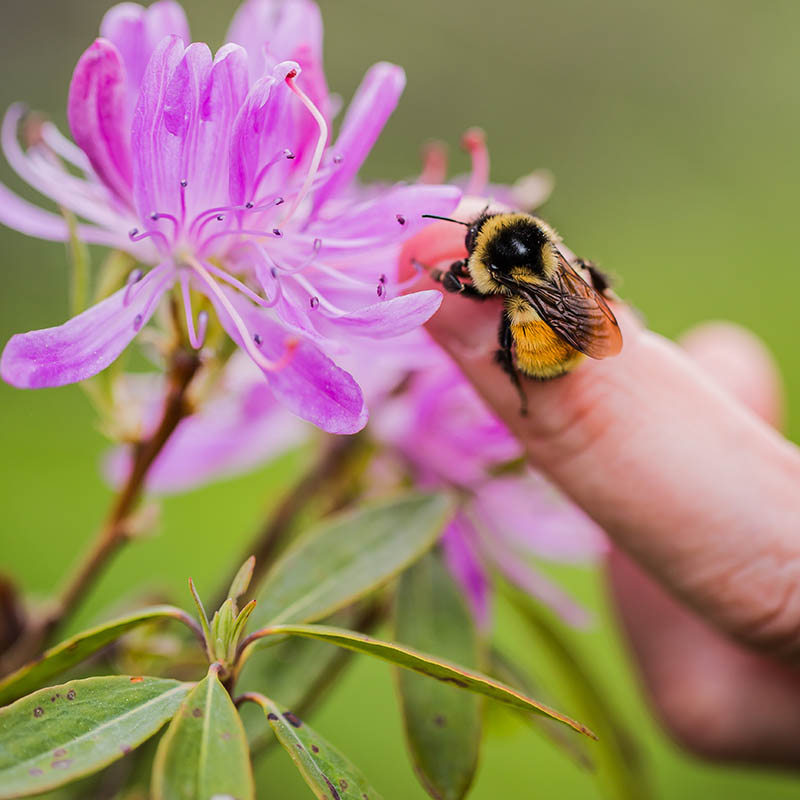
Powered by Science and the Environment
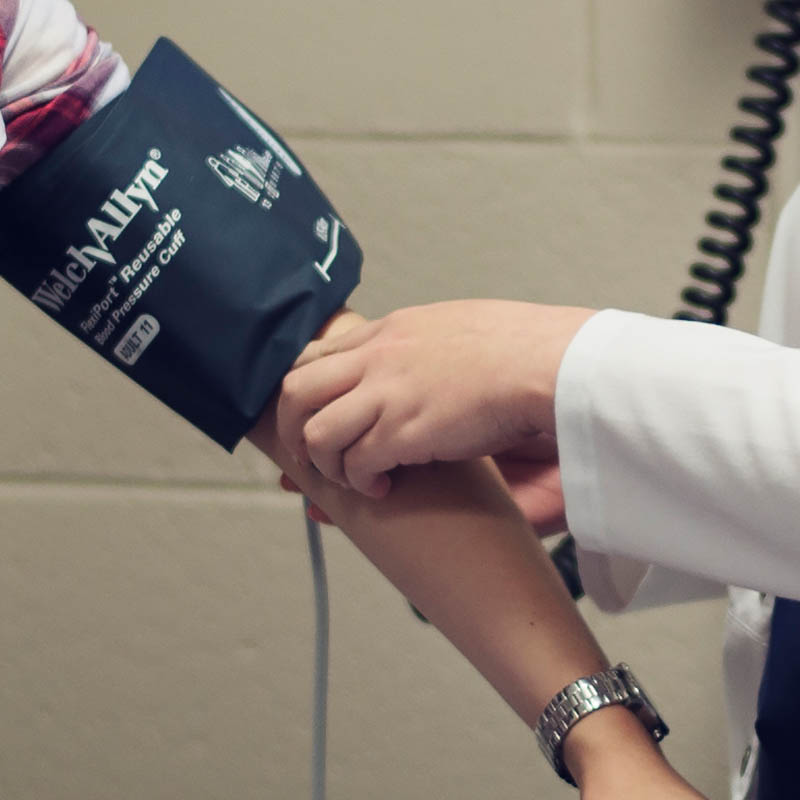
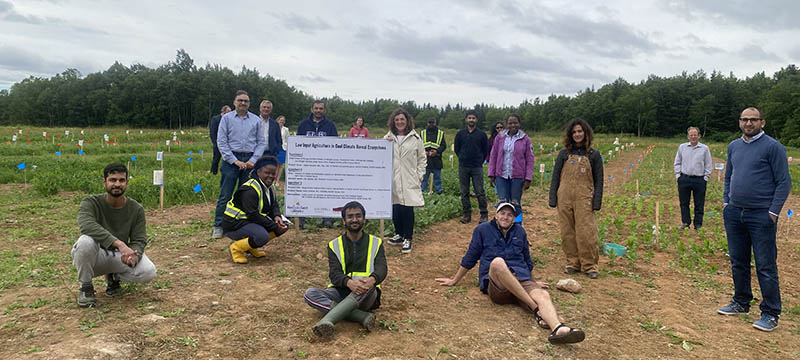
Researchers at the Pynn's Brook research facility welcomed Memorial University president Dr. Vianne Timmons for a tour recently.
Food and agriculture remain areas of vigorous research energy at Grenfell Campus. Many exciting research projects were underway in 2019-2020 including "Bridging the divide: Connecting and preparing refugees for work in the Province's agriculture industry". This project, undertaken in collaboration with the Association for New Canadians, sought to identify gaps and opportunities for refugee farmers to enter the agriculture sector, with a focus on workplace safety and secondary processing. The first phase of this project, which included a survey of refugees and former refugee farmers, ended in 2020. Findings identified secondary processing as an industry gap that refugee farmers, with appropriate skills, could fill. Funding has now been secured through Mitacs for phase two of the project, which will build on the challenges and opportunities identified in phase one. This includes matching of refugee farmers who have secondary processing skills with farm operations to improve secondary production. It also includes providing former refugees with an outlet to prepare and commercialize traditional foods to sell in the local market.
Recognizing the growing interest in food and agriculture on Campus, the Grenfell Food and Agriculture Working Group (AWG) was established in 2019. In addition to helping Grenfell meet its provincial Way Forward commitments and advancing efforts in food and agriculture research and development, the AWG assists with planning, implementation, and support of food and agriculture initiatives at Grenfell. Some of these initiatives include identifying priorities for food and agriculture activities and connecting with external community, government, and academic partners. The AWG has also been leading a proposal for the development of a food and agriculture hub and network based at Grenfell Campus.
Building upon a well-established tradition of collaboration between all campuses at Memorial University and the College of the North Atlantic (CNA), Grenfell is leading discussions on the development of a food and agriculture hub in Newfoundland and Labrador. The Boreal Food and Agriculture Research and Market Centre (B-FARM) facility is a pan-provincial, multi-campus, multi-institutional initiative that will provide leadership in advancing sustainable agriculture development and food security by strengthening the network of food and agriculture-related infrastructures and expertise across Newfoundland and Labrador. B-FARM will operate through partnerships with governments, post-secondary institutions, community, industry, Indigenous, and agricultural organizations to address challenges and leverage opportunities for food security and agriculture development in the province.
B-FARM is being developed collaboratively by Grenfell Campus, Labrador Campus, the Memorial University Botanical Garden, the Biology Department in St. John's, and CNA (Corner Brook Campus). The project involves four interdependent priorities: infrastructure and capacity building, research and development, entrepreneurship and innovation, and education and skills training. If funded, the project will see the RecPlex at Grenfell Campus renovated to include new facilities such as a food processing and venture centre, agriculture incubator, and permanent indoor/outdoor farmers' market. It will also see the development of teaching and learning greenhouses at CNA (Corner Brook Campus) and the Memorial University Botanical Garden, as well as purchase of the Pye farmhouse as a training, research, and education hub for the Pye Centre for Northern Boreal Food Systems.
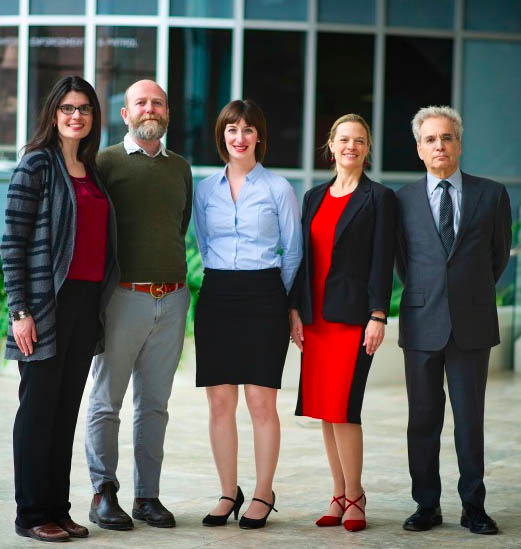
From left, Dr. Veronica Hutchings, director, ARC-NL: Dr. Ben Zendel, Canada Research Chair, (aging and auditory neuroscience): Dr. Karen Doody, ARC-NL project coordinator; Dr. Kelly Vodden, AVP Research and Graduate Studies, Grenfell Campus; and Dr. Stephen Bornstein, director, NL Centre for Applied Health Research.
Since its official launch in December 2018, the Aging Research Centre – Newfoundland and Labrador (ARC-NL) has made great strides in building a presence in aging research in our province where previously there was a void.
ARC-NL has quickly demonstrated its ability to realize its mission to foster inter-campus collaboration, create a researcher network for the study of late life issues in the province and to share knowledge through engagement with older adults.
"We really hit the ground running," said Dr. Veronica Hutchings, director, ARC-NL. "We've solidified our governance structure, held our first funding call for grants and fellowships in 2019, offered several public talks, participated in provincial and national conventions, and planned several public engagement and knowledge mobilization activities." In the 2019 inaugural round of funding, ARC-NL awarded seven research grants for a total of $68,095.39 to Memorial University researchers in disciplines/departments including Psychology, Nursing, Environmental Policy Institute, Biochemistry, BioMedical Sciences, and Epidemiology. That total was more than initially planned thanks to our partnership with the Harris Centre's Population Project. The Population Project contributed $20,000 – half towards the funded projects mentioned above and the other half to two other research projects by ARC-NL members.
ARC-NL has also formed partnerships and signed collaboration agreements with provincial and national funding agencies to help foster research on aging and increase research funds brought into the university and province. ARC-NL has strong ties with our founding partner, the Newfoundland and Labrador Centre for Applied Health Research (NLCAHR) and is a co-convenor of its Research Exchange Group on Aging (REGA). ARC-NL also has a close connections with SeniorsNL through the ARC-NL Management Board, and we work together to make sure events such as our future ARC-NL conference are relevant and age-friendly.
ARC-NL also signed a collaboration agreement with the Centre for Aging and Brain Health Innovation (CABHI) centred at Baycrest in Toronto, ON early in 2019. The collaboration led to a research group from Western Health that included ARC-NL members, submitting an application entitled "SmART Aging: A community-engaged program supporting healthy aging through arts and technology" to CABHI's SPARK innovation grant competition later that year. That application became the first one from NL to be awarded a grant from CABHI.
But there's still much to do as the centre works toward making it a permanent research centre at Memorial.

The two-day symposium Msit No'kmaq/All My Relations furthered understanding and relationships. Submitted photos
As a research, learning and outreach and engagement institution located in traditional Mi'kmaw territory, Grenfell Campus recognizes its responsibility to foster respectful, ethical relationships with the diverse peoples of the province of Newfoundland and Labrador. This responsibility stretches to the Mi’kmaw communities and groups throughout Newfoundland and the Inuit and Innu peoples in Labrador. Building respective relationships from campus to community across cultures requires humility, understanding, patience and commitment. Collaborative research and initiatives that facilitate the co-creation of knowledge will ensure Grenfell Campus as an institution listens to and learns from Indigenous knowledge holders, students and leaders engaged in various projects across disciplinary boundaries.
In 2019, graduate student-led projects engaged with Indigenous groups across Newfoundland and Labrador included collaborations with Miawpukek First Nation in Conne River, Newfoundland, No’kmaq Village Band, in Flat Bay, Newfoundland, and NunatuKavut Community Council (NCC) and Nunatsiavut in Labrador. Additionally, Kelly Anne Butler with Grenfell Campus' Indigenous Resource Centre collaborated with the Bay St. George Cultural Revival Committee to host the first session of the Maw-lukutinej/Let’s Work Together: Indigenous Studies in Collaboration symposium series.
Originally highlighted in the 2018 research report, Jason Dicker completed the Master of Arts in Environmental Policy program at Grenfell Campus in 2019 and went on to a new position working with the Nunatsiavut Government. His thesis was entitled Using integrated resource management and the Public Trust Doctrine to examine wildlife management practices in northern Labrador: a case study on the George River Caribou hunting ban.

Indigenous Research Collaborations.
Brady Reid, a settler-scholar (non-Indigenous scholar) embarked on a research journey of self-discovery and community engagement with the No’kmaq Village Band in Ewipkek (Flat Bay) in western Newfoundland in 2018. From initial relationship-building within the community, Brady continued to work with Elder Calvin White and others in the community throughout most of 2019 as part of the Master of Arts in Environmental Policy program at Grenfell Campus. Brady wrote and completed his thesis in August 2019 entitled Traditional knowledge and land use: Building research relationships with a rural Ktaqmkuk Mi'kmaw community. His work provided direction and recommendations for other researchers working with Indigenous communities. This research highlighted key considerations for researchers to build respectful, ethical relationships at all stages of research that involve Indigenous peoples, concepts, or knowledge while supporting the interests and ongoing projects in the community of Ewipkek.
Beginning her master of science in environmental science at MUN in September 2019, Katherine Flores has been working with Dr. Michele Piercey-Normore at Grenfell Campus and Dr. André Arsenault with the Canadian Forest Service (and adjunct faculty at Grenfell Campus) on forest conservation research using species of arboreal lichens as indicators of ecosystem integrity. Miawpukek First Nations in Conne River, Newfoundland has been identified as a hot spot for many lichen species and the community has served as a leader in lichen research and conservation in Newfoundland and Canada. Partnering with Miawpukek First Nation and the Canadian Forest Services strengthens the integrity of the research while also building multi-disciplinary and cross-cultural relationships with external collaborators.
Amy Hudson, originally from Black Tickle off the southeast coast of Labrador in NunatuKavut, the traditional homeland of Inuit from this region, worked collaboratively with the NunatuKavut Community Council (NCC). In 2019, Amy was a PhD student in the Interdisciplinary Program at MUN who worked with Dr. Kelly Vodden at Grenfell Campus as her lead supervisor to examine the intersection between Indigenous research methodologies and sustainability planning in communities across NunatuKavut.
Aside from graduate student-led projects, in October of 2019, a formal collaboration began with the two-day symposium Msit No'kmaq/All My Relations. This symposium was the first of three symposia as part of the larger engagement project, Maw-lukutinej/Let's Work Together, a collaboration of the Bay St. George Mi'kmaq Cultural Revival Committee, the Grenfell Campus Indigenous Resource Centre, and Grenfell Office of Research and Graduate Studies.

Kamsika Jeyarasa
Many of our graduate students are very involved in community-engaged research and activities.
For instance, Roshayne Mendis, a student in the master of arts in environmental policy program, had the opportunity to study the perceptions of residents of Bonne Bay, NL, regarding the potential threats to areas close to Gros Morne National Park. It was a comprehensive document that captured the thoughts of the residents on the beauty of the bay together with their thoughts about Marine Protection and its potential benefits for the future.
Ms. Mendis worked with the Friends of Bonne Bay. The Friends of Bonne Bay was formed to provide a collective voice on issues related to the environmental and cultural health of both marine and coastal areas of the bay. Ms. Mendis's work with the group was funded by Memorial's Centre for Social Enterprise and the Canadian Parks and Wilderness Society (CPAWS) through a Work Experience in Social Enterprise placement and met the requirements for her environmental policy internship.
Ultimately, the Friends of Bonne Bay and CPAWS are seeking to document the opinions of people in area with respect to creating a "Marine Protected Area." Ms. Mendis met with local residents and business leaders to document the various perspectives on the issue.
Meanwhile, Kamsika Jeyarasa, who is pursuing a master of science in boreal ecosystems and agriculture science, is conducting a research project titled "Design, development and evaluation of a simple and low-cost hydroponic system."
Funded by Mitacs and EasyGrows Indoor Garden Centre, her research aims to design and develop a simple, low-cost, low-energy-consuming, vertical hydroponic system for households and small communities.
Most recently, she's been conducting socio-economic surveys and key informant interviews for identified groups of people, beginning with Grenfell students, faculty and staff.
Her second survey will focus on the general public in Corner Brook, supported by key informant interviews with academics, agriculture experts, government officers, grocery managers, and others connected with the "growing" industry.
"These surveys and interviews are basically for the purpose of collecting information on vegetable production, consumption, preference, price variation, availability and also understanding, awareness on hydroponic systems and willingness to have one at their houses," said Ms. Jeyarasa.
Once she has gathered the survey and interview information, she plans to design and develop a hydroponic prototype.
"Hopefully the design will suit the needs of people in the area and will help increase the availability of produce at the household level," she said.
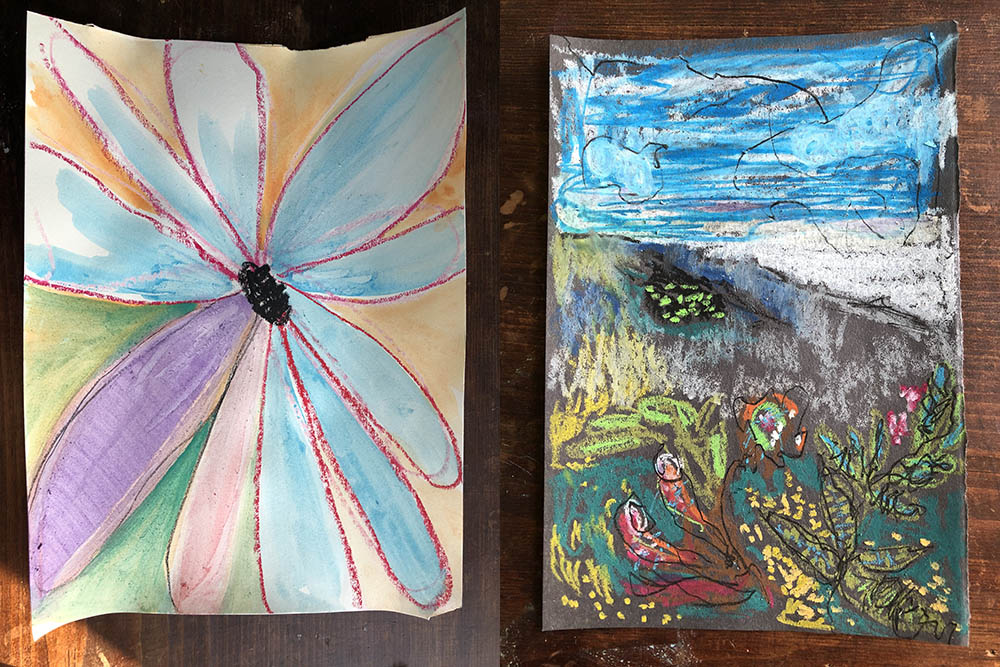
MFA student Lorna Conquergood provided these examples to show participants the sorts of art they could make during her art workshop on Fogo Island. Submitted photos.
Lorna Conquergood, a student in the master of fine arts (visual arts) program, spent a month on Fogo Island as part of an artist residency sponsored by the owners of the Coffee Cove Seaside Retreat. She spent a month painting and drawing in a studio shed they provided while staying in their "Baker House Cottage."
While in Fogo, Ms. Conquergood had the opportunity to share her talent with local residents as part of the "Féile Tilting Festival." The festival, now in its eleventh year, is a celebration of the island’s Irish/Newfoundland culture.
Ms. Conquergood hosted a workshop for the festival to talk about her work during the residency, and provide parents and children an opportunity to connect through art.
"Just like in my own neighbourhood at home, community events are important for kids and parents to connect with each other, even if it's for short periods of time," she said. "Small town living can be hard and very isolating – parenting small children can always feel isolating, even if you aren't living in a small town on a remote island."
She provided all art supplies provided demos for a couple activities that they could complete.
"It is so interesting to look back to a year ago and get a perspective on the importance of these kinds of events," remembered Ms. Conquergood. "Our communities are missing out on so many potential gatherings during these times of lock downs and isolation."
Our changing world calls for new ways of interacting with our natural environment and researchers at Grenfell Campus are engaging with industry to find new, sustainable opportunities for Newfoundland and Labrador. In a province that has built its economy on resource extraction, researchers continually explore new ways to face our economic future while also mitigating and addressing climate change. The field of bioeconomy explores how a growing consumer demand for sustainable products and services can become an opportunity for development of a rurally centered and sustainable industry through the strengthening of the region’s bioeconomy. Bioeconomy generally refers to the knowledge-based production and use of biological resources to provide products, processes, and services in all economic sectors within the frame of a sustainable economic system. As a novel and environmentally conscious economic activity, the bioeconomy is revamping the forest industry across the globe. In a forest-based context, bioeconomy involves using forest resources to create products and services that replace fossil-fuel based products and services.
In 2019, the work led by Dr. Stephen Decker and a team of academics and industry partners has taken off. With funding received from the Workforce Innovation Centre and in partnership with NL Forestry Industry Association, Qalipu Development Corporation, Women in Resource Development Corporation, Newfoundland and Labrador Environmental Industry Association, and the Industry Services, Fisheries and Land Resources, they are carrying out a comprehensive, in-depth comparative case study of five regions in Newfoundland. They are exploring how to effectively develop and promote the potential of the bioeconomy in the forest sector to underrepresented groups. The project is collaborating closely with regions where the pulp and paper industry has been key to their history. The partners include paper mills in Bloomfield, Twillingate, Hampden, Corner Brook, and the Great Northern Peninsula.
This builds on Grenfell's ongoing applied research collaboration with Corner Brook Pulp and Paper Limited and College of the North Atlantic (CNA), coordinated under the Center for Research and Innovation. This project includes a rehabilitation of CBPPL’s former Human Resources building as a hub for innovation and learning for the City of Corner Brook, and a program of research which seeks to address the rapidly changing pulp and paper industry. The Centre for Research and Innovation is funded by different sources, including federal funding through ACOA and Clean Tech, Emera Inc., provincial funding through Energy Innovation Technology, the City of Corner Brook, and Mitacs-funded internships for graduate students and a two-year postdoctoral researcher.
The research that is currently in its second year explores alternate uses for by-products such as paper mill ash and sludge as a soil amendment in agriculture and composting of sludge biomass – materials that would have otherwise been considered waste. After officially launching the research project, a first round of field trials at the Pynn's Brook Research Station was completed in 2019. Students and the Postdoctoral Researcher presented their progress to Corner Brook Pulp and Paper during the Winter and Fall semesters of 2019.
Research in bioeconomy and forestry carried out by Grenfell researchers was featured during Innovative Forest Research Day on February 22, 2019. This event held at Grenfell Campus and organized by the Canadian Forestry Services (CFS), in collaboration with the Canadian Institute of Forestry - Newfoundland and Labrador Section (CIF), and the Registered Professional Foresters of Newfoundland and Labrador brought together representatives from academia, industry, government, and community.